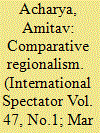| Srl | Item |
| 1 |
ID:
111543


|
|
|
|
|
| Publication |
2012.
|
| Summary/Abstract |
Is comparative regionalism a field whose time has come? While the contemporary interest in comparing regions and regionalisms may be not completely new, it is different from older approaches. Our understanding of what makes regions has changed with social constructivist and critical theoretical approaches that have led to a less behavioural and more nuanced, complex, contested and fluid understanding of regions. Moreover, the globalisation phenomenon has deeply affected all social sciences and radically redefined the relative autonomy of regions. In keeping with the rapid growth and development of regionalism and institutions in the non-Western world, including in regions which were relatively late starters, such as Asia, there have emerged new ways of looking at regional cooperation, including claims about distinctive approaches and even 'models' that are not only different from those identified with the EU, but also supposedly more appropriate and thus 'workable' for non-Western regions than the EU straightjacket.
|
|
|
|
|
|
|
|
|
|
|
|
|
|
|
|
| 2 |
ID:
141622


|
|
|
|
|
| Summary/Abstract |
Given competing interests among the three littoral states of Malaysia, Singapore and Indonesia, what explains the nature and timing of their cooperative arrangement in combating maritime piracy in the Straits of Malacca in the post-2004 period? This observation is especially puzzling because the material and strategic interests of these actors generally did not change during the time period that witnessed increased cooperation. We argue that key developments of the anti-piracy regime in the Straits of Malacca cannot be fully explained by rationalist approaches, which traditionally stresses material and national interests of states. By critically engaging constructivist approaches, this paper posits that Malaysia, Singapore and Indonesia engaged in a process of norm subsidiarity. Through norm subsidiarity, relatively weak states get together to develop their own rules to prevent their exclusion or marginalization from institutions of global governance by more powerful actors. The littoral states engaged norm subsidiarity to resist extra-regional attempts to manage piracy in the Straits of Malacca. These extra-regional security proposals triggered a powerful regional cognitive prior, providing the impetus for an indigenous response, leading consequently to a collective cooperative effort to deal with the threat of piracy.
|
|
|
|
|
|
|
|
|
|
|
|
|
|
|
|